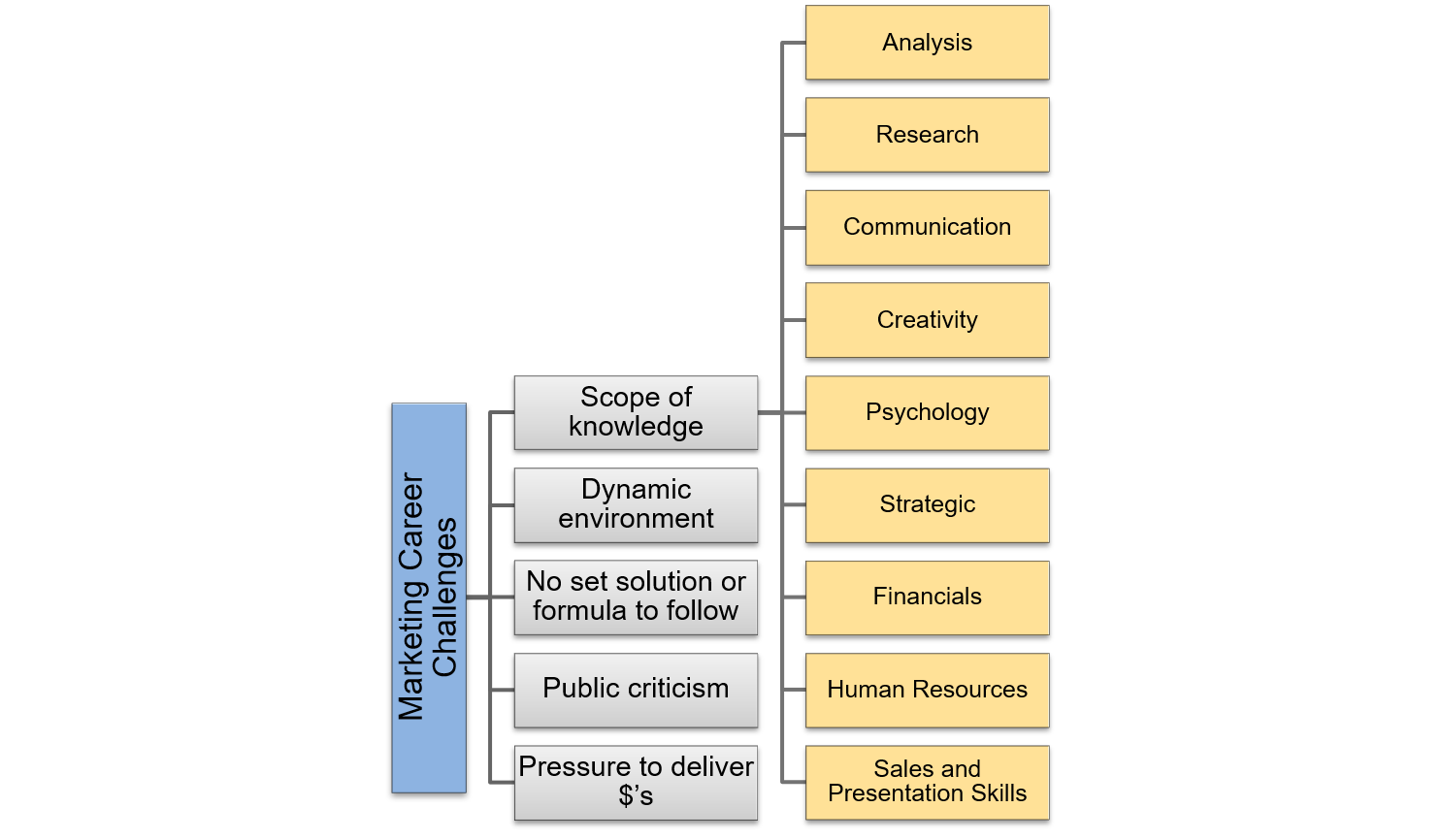Is a marketing career easy?
Sometimes students study marketing in a business course because it is perceived to be somewhat easier than more challenging and technical areas, such as economics, finance, and analytics.
However, from the point of view of somebody has both practiced and lectured in the area of marketing, I would challenge this perception and suggest that marketing is indeed a very challenging, but worthwhile, career path to pursue.
Some unique challenges of being a marketer
A range of skills is required
To deliver results in marketing, you need to have a broad scope of skills – from strategic, analytical, research, creative, new product development, project planning, communication, persuasiveness, and so on.
One day you would be analyzing statistics, customer database information and/or marketing research results, in the hope of identifying market insights they can gain your firm a competitive advantage. The next day you will be involved designing creative communications, or mapping out the design for a new product, or working out sales incentives, and so on.
While in the early stages of your career, you are likely to specialize in one of these areas, as you progress up the corporate ladder you will need a broader scope of skills and abilities.
Significant interaction and persuasion is required
Marketing needs to work closely with other specialists within a firm – such as, finance, human resources, IT or manufacturing, front-line staff, operational managers, and the CEO and executive team.
When you consider the marketing mix – it includes product, price, place, people, process – which are generally managed on a day-to-day basis by other functional areas.
For example, people (staff) will have their direct managers, as well as indirect influence from the human resources department. However, in a service firm in particular, the role of customer contact staff is significant in the overall degree of marketing success. This means that marketers have to work with the HR area and operational managers to influence staff behaviour and actions.
Obviously, the same principle applies to influencing the overall strategy of the firm, keep price decisions, key channel selections and so on – there’s always another functional area that the marketer has to work with and perhaps persuade to their viewpoint.
Marketing is dynamic
Marketing keeps changing. The approach to marketing in the early 2000’s compared to today is quite different. Certainly the fundamental concepts of targeting and positioning and meeting customer needs remain the same, but many of the tools have evolved.
In recent years, businesses have access to far more data and have become increasingly analytical as a result. And the Internet and social media has transformed how many industries operate and how consumers make decisions.
Industries such as banking and retailing have evolved substantially over the last decade or so, which means that marketers constantly have to improve their skills, stay up-to-date, and adapt new practices and tools.
And as well as technology and data involving the marketing tools, there are substantial variations in our competitive sets, consumer behavior, and various other environmental factors.
No generic marketing solutions
There is no one-size-fits-all solution to marketing. That means, but a marketing strategy that works well at Firm A may not work as effectively for Firm B, even though they appear to be similar types of businesses.
There are so many factors that need to be considered in constructing a suitable marketing strategy and marketing mix. We need to consider both the internal and external environments of the, which will never be the same for two firms even though they are of similar size and competing in the same industry.
Indeed, it is possible, that adopting a competitor’s successful approach to strategy will be a significant mistake for the firm. So unlike other functions in business, marketers can take their skill set to a new organization, but will most likely have to adapt their strategic approach.
Marketers get criticized
A lot of marketing activities is public. Marketers introduce new products that either fail or succeed and are critically reviewed by staff, consumers, and online.
Marketers produce communication, such as advertising. Again there is substantial commentary around new ads, especially for large brands. And usually, not everybody will like a campaign or a new product, regardless of how successful it is.
Therefore, marketers are likely to have many negative comments regarding their performance and the implementation of the marketing mix.
Marketers need to pay for themselves
Marketers are profit managers and are employed to make more money for the company. If a marketing manager is employed on $X, then the expectation from the company is that they will deliver $X and more in terms of profitability.
A marketer who has not made a substantial improvement to the bottom line within the first 1 to 2 years of being with the company is properly not going to be there much longer.
The wrap-up: the challenges of marketing
Marketing is a fun, dynamic and exciting profession where you can make a substantial difference to a company. You can help define its brand, its market positioning, shape its overall value proposition, influence various areas and departments and their operations.
That is why many are attracted to marketing.
However, as outlined above, marketing careers are challenging. Marketers need to deliver results, constantly evolve, influence and persuade non-direct reporting staff, and handle public criticism. So in many ways there are unique challenges in marketing that do not exist in other functional business roles, as summarized in the below diagram.
Academic Article
The employability attributes required of new marketing graduates

